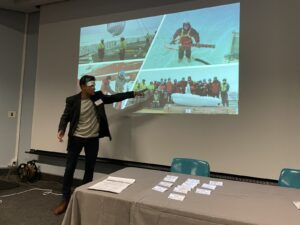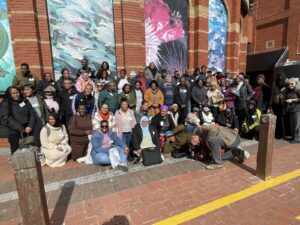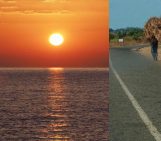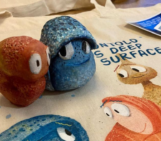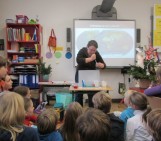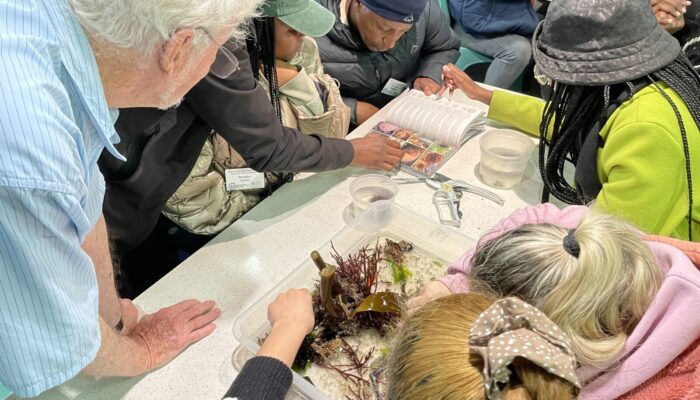
The final edition of the capacity building Geoscience Information For Teachers (GIFT) workshop was held this year in Cape Town, South Africa. This three-year programme, an initiative by the EGU Education Committee, brought together local teachers and scientists to build a sustainable, long-term workshop series and network for teacher training in geoscience education. The 2024 theme was “Exploring Antarctica”, and included talks and practical sessions which brought the latest science to teachers for use in their classrooms.
Bringing science to the classroom
Building on the success of its predecessors, the 2024 workshop hosted 52 teachers from mostly rural and disadvantaged areas. These teachers have large classes, often no working internet access, outdated school books, and little support by the administration. Teachers joined the workshop through the growing, local network, supported by the GIFT workshop’s organisers, which connected teachers with scientists and learning institutions.
Many attendees were also returning to GIFT following their positive experience of previous workshops. A key benefit of featuring returning teachers was the development of a local learning ecosystem where connections were strengthened between teachers and scientists, attendees stayed up-to-date on the latest developments in geoscience, and and were able to implement new workshop content in their classrooms.
This year‘s workshop was hosted by the Iziko South African Museum, which featured visits to the museum’s regular exhibition and classrooms for hands-on activities. The GIFT Cape Town workshop set itself apart from the museum’s regular workshops, which cater to learners, by providing training to teachers. While the Iziko Museums focus on topics featured in the museum’s exhibitions, the GIFT workshop offers a broader scope and invites external experts to participate. The workshop hosts scientists from the University of Cape Town, for example.
This follows the tradition of working with local institutions for outreach and learning to host the workshop: previous GIFT Cape Town workshops also visited the Two Oceans Aquarium, which included hands-on classrooms and a behind-the-scenes tour. Both venues proved highly attractive for the teachers and also for possible future field trips with their students.
Sustainable learning for local teaching
Key to local teachers engaging with the workshop and identifying their needs, has been the development of a teacher-scientist network. The network grew substantially within the last year with support by the workshop’s organizing committee, which included representatives from the University of Cape Town, the Iziko South African Museum, and the EGU Education Committee. This network includes teachers’ organisations, like the Western Cape Education Department, and scientists from local universities and institutions, such as the Iziko Museum itself and the Two Oceans Aquarium, both of which also employ scientists.
The workshop programme was designed around the needs of local teachers, offering a mixture of scientific talks and practical sessions, including hands-on activities and guided tours through venues of educational interest to teachers. Part of meeting the needs of teachers included ensuring the workshop respected the teaching responsibilities of the attendees: the workshop was designed to last two days over a weekend, because it is virtually impossible for teachers to find substitutes for their classes during the weekdays: not only would they have to find substitute teachers themselves, the teachers would also have to pay for them.
An additional consideration was the impact of COVID on teacher training opportunities: costs have considerably increased across the country, with local sponsors favouring shorter programmes to reduce the financial burden. To honour the aim of capacity building – to create a self-sustaining workshop and network for local teachers and learning institutions – the organising committee was committed to bringing down costs wherever possible.
Sponsoring local capacity building
A key objective of the capacity building workshop was the complete handover of leadership to local organisers; it is important to build local sponsorship to secure a sustainable, long-term series that serves local teachers. The 2024 workshop was supported by both local and European sponsors, and marked a transition in support with a considerable amount provided by local sponsors.
European sponsorship included a significant contribution of Westermann Publishing House – with the help of Education Committee member, Annegret Schwarz – who provided education material through 50 Diercke International Atlasses in hardcopy and 60 codes for the digital version of their International Atlas.
Of the 54 responses to the workshop feedback survey, 85% awarded the workshop a 5 out of 5 with the remaining 15% giving 4 out of 5. Teachers particularly lauded the hands-on activities provided. This feedback has fed into a great desire to continue the GIFT series in the future; numerous teachers keep asking about repetition then of GIFT workshops in Cape Town.
With the final edition of GIFT Cape Town complete, leadership has been fully handed over to local organisers. To meet the enthusiasm for the workshop’s continuation, the organising committee has continued to collaborate with local sponsors and to find creative solutions to the workshop’s development whilst still keeping in contact with the European Geosciences Union.
The European Geosciences Union thanks the organising committee for the EGU GIFT Cape Town capacity building series: Friedrich Barnikel (EGU Education Committee), Stephen Macko (EGU Education Committee), Wendy Taylor (University of Cape Town), Thandi Nqubelani (Iziko Museums) and Anton van Wyk (Iziko Museums).


